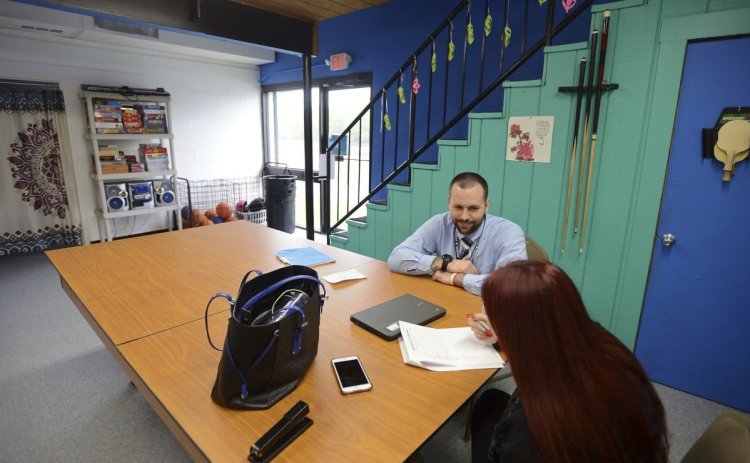GLOUCESTER, Mass. — Students who get in trouble at Gloucester High School will soon be offered a chance to serve their suspensions at a youth center in Beverly with some tutoring, counseling and other support services, as opposed to hanging out around town or at home.
It’s part of a new pilot program called Positive Alternatives to Student Suspension, or PASS. Four school districts – Gloucester, Peabody, Beverly and Ipswich – have agreed to offer students a chance to attend the program instead of serving a suspension.
The program offers students one-on-one tutoring and counseling, time for homework, and support groups on coping skills, substance abuse recovery, healthy relationships, art and music, and mindfulness and yoga.
Gloucester High Principal James Cook said the school has a twofold goal in this: Provide alternatives to straight suspension and address underlying issues that led to the disciplinary action.
“We want students in a positive environment,” Cook said.
ADDRESSING MENTAL HEALTH
The eight-week program, which began April 23 and runs through the end of the school year, is a partnership between the Greater Beverly YMCA and Northshore Recovery High School. It is the brainchild of Michelle Lipinski, director of Northshore Recovery, a Beverly school for students struggling with addiction.
Lipinski said the program is intended to offer help to students before they end up at Northshore Recovery. She said students are often suspended for drinking or drugs and sent home with little or no support.
“So many times when a student has a disciplinary hearing, it has to hurt,” Lipinski said. “We know that does not help a child whatsoever. That’s not taking care of the issue. There are underlying mental health issues, and that’s what we need to address.”
The program is voluntary for students. As an incentive, they can cut their suspension in half if they attend. So far, nine students have taken part.
Gloucester High hasn’t sent any students yet, as school staff figure out the logistics of getting students there and some other details, Cook said Thursday.
After a student at the Peabody Community High School was suspended recently for vaping, she would have spent her days at home sleeping, she told a school administrator. Instead, she was sent to the McPherson Youth Center in Beverly to speak to counselors, do her homework and get support rather than punishment.
“It’s a better alternative,” said Craig Macarelli, director of Peabody Community High School, a special education school within the Peabody School District. “If they’re suspended, they’re going to go home and do the same thing they got suspended for.”
Program Director Nancy Marrs said students have reacted positively to the change in environment. Upstairs at the McPherson Youth Center, there are couches, a sound machine and an essential oil diffuser. Students can step outside and play basketball or walk the walkway along the Bass River. Free snacks and drinks are provided.
“I find the students are really motivated being off-site,” Marrs said. “They’re taking accountability. We asked one student, ‘Do you want to take a break?’ and she said, ‘No, I want to get caught up on my homework.’ ”
BRINGING IN OTHER DISTRICTS
Judith Cronin, executive director of the Greater Beverly YMCA, said the Y agreed to take part in the program because helping teens who are struggling is part of the Y’s mission. The McPherson Youth Center is used as a drop-in teen center after school, but was available during school hours. Marrs, the director, is a YMCA employee.
“We see this as a positive step to help with their problems before they get to Northshore Recovery School,” Cronin said.
The Northshore Education Consortium is funding the pilot program for about $20,000, Lipinski said. Children’s Friend and Family Services of Salem provides a clinician and a youth specialist. The students can continue to see a counselor after they leave the program.
Organizers are hoping to use data from the pilot program to convince other school districts to take part and provide funding. Lipiniski said the program could eventually serve about eight students per day, which would amount to more than 1,000 students over a full school year.
Macarelli, who is in his second year as director at Peabody Community High School, said the concept of sending their students elsewhere for help can be difficult for school districts. But he said it’s a much better alternative than sending them home.
“They can come back to school feeling positive instead of just feeling that they’ve been punished,” he said.
Send questions/comments to the editors.


